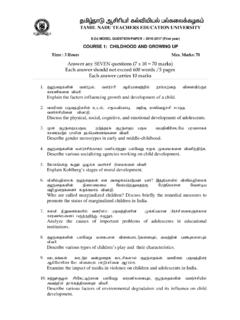Transcription of TAMIL NADU TEACHERS EDUCATION UNIVERSITY
1 TAMIL nadu TEACHERS EDUCATION UNIVERSITY Chennai-600 097 Course Material for ( First Year) (2016-2017) Course 7a: Pedagogy of English (Part I Methodology) Prepared by Unit I Aims And Objectives Of Teaching English Stephen Assistant Professor Unit II Planning for Instruction , Assistant Professor Unit III Practising the skills in teaching English , Assistant Professor Unit IV Teaching and Testing Language skills Stephen Assistant Professor Unit V Methods of teaching English Assistant Professor Unit VI Testing and evaluation in English Assistant Professor TAMIL nadu TEACHERS EDUCATION UNIVERSITY Chennai-600 097 Course 7a: Pedagogy of English (Part I Methodology) TAMIL nadu TEACHERS EDUCATION UNIVERSITY 2 UNIT: I AIMS AND OBJECTIVES OF TEACHING ENGLISH Objectives: the students will be able to 1.
2 Understand the aims and objectives of teaching English 2. Understand the rationale for learning English 3. Comprehend the importance of four language skills 4. Learn the significance of spoken skill THE IMPORTANCE OF ENGLISH IN INDIA Introduction English has been playing an important role both in our educational system and in our national life. English was supreme during the pre-dependent India. It was the language of administration, a compulsory subject in schools and colleges. English still occupies an important place in our educational system and life of our country. Importance of English language in India 1. As an official language of administration English has been the official language of the country for more than 300 years.
3 All the administrative works are done in English throughout the country. 2. As a language of the court English still continues to be the language of the courts in India. So far, there is no other suitable language for legal transaction, not only at the Supreme court but also at the High courts. 3. As a language of International trade and industry English dominates in the fields of trade and industry in India, because most works in these fields are carried in English. Course 7a: Pedagogy of English (Part I Methodology) TAMIL nadu TEACHERS EDUCATION UNIVERSITY 3 4. As a window on the modern world Jawaharlal Nehru, the former Prime Minister of India has rightly said, English is our major window on the modern World.
4 English is a window through which we can see the scientific, technological, agricultural and commercial development taking place in the world. English is the only language through which we have distilled the essence of modern knowledge in all fields of human activity. 5. As a library language English is the key to the store-house of scientific, technological and computer knowledge. Most of this knowledge is not yet available in Indian languages. It is in this context that the role of English as a library language becomes important in India. 6. On the Internet English is the only language which dominates on the Internet. Websites are created mostly in English. People send emails using the Internet. Facebook is used in English for most social interactions in the world.
5 Conclusion From the above we come to know the significance of English in India. English plays a role of paramount importance in the country s national life as well as educational system. Rationale for learning English Students often choose to study a language to which they have an existing cultural, family, or community connection. But there are many other possible reasons. For example, students might be interested in: travelling to other countries and learning about other cultures learning about celebrations, festivals, and cuisines of other cultures exploring and enjoying films, fashion, music and the popular culture of another country Learning more about how languages work communicating with friends from around the world via social networking opportunities Participating in cultural and sports exchanges.
6 Learning a second language can bring a great deal of personal satisfaction and pleasure. It can also open up a much broader range of future work opportunities by: Course 7a: Pedagogy of English (Part I Methodology) TAMIL nadu TEACHERS EDUCATION UNIVERSITY 4 making it easier to work, travel, and study in other countries developing the skills to work across cultures providing access to a wider range of ideas and knowledge Generally strengthening literacy skills. Learn more about yourself, and your own culture, too Learning a second language is not just about opening up opportunities for work and travel it is likely to prove a journey of personal discovery.
7 Experience of other cultures can help us understand and appreciate our own. In the broad picture, young people who learn a second language acquire knowledge, skills, and understandings that are important for the social, cultural, economic, and environmental well-being. Some more reasons for learning English English offers the freedom to explore. English fosters creativity English enables learning English develops thinking English promotes participation FOUR AIMS OF TEACHING ENGLISH The following are the four general aims of teaching English: 1. To enable the students to understand English when spoken. 2. To enable them to speak English. 3. To enable them to read English. 4. To enable them to write English. These aims correspond to the four language skills or abilities viz.
8 Listening, speaking, reading and writing. Listening and reading are passive or receptive skills, whereas speaking and writing are active or productive skill. It is easier to learn receptive than productive skills. Course 7a: Pedagogy of English (Part I Methodology) TAMIL nadu TEACHERS EDUCATION UNIVERSITY 5 OBJECTIVES OF TEACHING ENGLISH Importance of Aims Aims are the direct outcome of the purposes for which language is taught. Without aims we are like the traveler who does not know his destination or even the direction in which he is going. Rightly has observed, In teaching, it is highly desirable to know exactly what one is hoping to achieve, as it is in all great undertaking.
9 The aims may also be classified as those of reception and expression . Reception means understanding spoken and written English. Expression means speaking and writing English. The aims of teaching English have been interpreted in terms of mastery over words and structures. The study Group of Teaching of English (1971) recommended the following class-wise division of the syllabus or the level of attainment to be reached in each class in terms of the structures or teaching points (mentioned here as points only) and vocabulary items. Class VI : Points 1 to 50 : 300 words for active use. Class VII : Points 51 to 100 : 300 new words for active use. Class VIII : Points 101 to 170 : 300 words for active use; 200 new words for passive use.
10 Class IX : Points 171 to 200: 300 New words for active use; 300 new words for passive use. Class X : Points 221 to 280 : 300 new words for active use; 300 new words for passive use. By the end of class X, students will have acquired command of the structural basis of English; so in class XI the language learnt so far will be consolidated and extended through suitable texts. GENERAL PRINCIPLES OF LANGUAGE TEACHING 1. Speech before writing Listening and speaking should be taught first, reading and writing next. 2. Basic Sentences Course 7a: Pedagogy of English (Part I Methodology) TAMIL nadu TEACHERS EDUCATION UNIVERSITY 6 The teacher should help the students memorize basic conversational sentences as accurately as possible.















